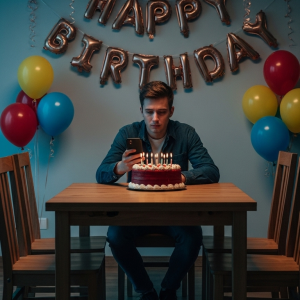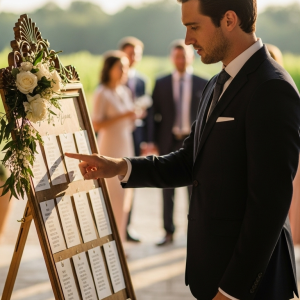I am sixty-seven years old, and I thought I had experienced every kind of heartbreak life could offer. I was wrong.
Mother’s Day began in the quiet emptiness that had become my life since my husband, Harold, passed. I made coffee for one and tried not to listen to the silence. My daughter, Oilia, had called the night before, her voice a cool, distant instrument of obligation. “Mom, we’re having brunch at David’s mother’s house tomorrow. You should come. One o’clock sharp.” You should come. Not we’d love to have you. An assignment, not an invitation.
I arrived at Patricia’s house precisely at one. The driveway was a gleaming river of luxury cars. Laughter spilled from the backyard, a world away from my silent home. Patricia, my son-in-law David’s mother, had always been everything I was not: polished, social, effortlessly elegant. Her home was a magazine spread of white marble and fresh flowers.
When I stepped onto the patio, I saw them. Oilia was seated beside Patricia, their heads bent together, sharing a private joke. David was at the grill, playing the part of the devoted son.
“Colleen,” Patricia called out, her smile perfectly practiced. “So glad you could make it.” Oilia glanced up, offering a quick, dismissive nod. “Hi, Mom. You can sit over there.” She gestured to a lone, empty chair at the far end of the table, an island of isolation.
I sat quietly, an anthropologist studying a foreign tribe. David’s sister was there with her children, Patricia’s bridge club friends, even the neighbors. Everyone belonged, except me. Then came the gifts.
“Oh, Patricia, we have something special for you,” Oilia announced, her voice alive with an excitement I hadn’t heard directed at me in years. David produced a small velvet box and an envelope.
Patricia gasped as she opened the box. Inside was a stunning diamond ring that threw shards of light across the patio. “Oilia, honey, this is too much!” “It’s not too much for the woman who raised such an incredible son,” Oilia gushed, hugging Patricia tightly. “And there’s more.”
The envelope held tickets for a two-week Mediterranean cruise, first class. Patricia began to cry. Everyone applauded. Oilia beamed, radiant with pride. A cold knot formed in my stomach. That was a $20,000 gesture, at least.
“And now for Grandma Colleen,” David said, his enthusiasm visibly deflating. Oilia brought me a small gift bag. Inside was a plastic flower from a dollar store and a generic drugstore card. I opened it. The printed message said, “Happy Mother’s Day.” Underneath, in Oilia’s handwriting, were three words: “Thanks for everything.” As if I were a cashier who had just bagged her groceries.
The table fell silent. I could feel their stares, a mixture of pity and embarrassment. “It’s lovely,” I managed, my voice a whisper. “Thank you, dear.”
But Oilia had already turned back to Patricia, the conversation moving on without me. I sat there, holding my five-dollar plastic flower, feeling smaller than I had in years. I stayed for another hour, watching my daughter lavish attention on a woman she’d known for a decade, while treating the woman who gave her life like an afterthought.
The drive home was a blur. Forty-three years of being her mother, and this is what I was worth. A last-minute item from the clearance aisle. That night, sleep wouldn’t come. I walked to my home office, to the files and documents that constituted my life’s work. And for the first time, I began to question what, exactly, I had built it all for.
One sleepless night bled into a sleepless week. I couldn’t stop thinking about the plastic flower, about the look of pure adoration Oilia gave Patricia. It was a physical ache. I decided I needed answers—the kind hidden in bank statements and old receipts.
Harold used to tease me for keeping every document. “You never know when you might need proof,” I’d tell him. I never imagined I’d need proof of my own motherhood.
The numbers told a brutal story. $47,000 for Oilia’s college tuition, not including the car I bought her. $58,000 for her wedding, a day I funded entirely because I wanted it to be perfect. David’s parents contributed a case of wine. I had co-signed for their first house. When David’s business struggled two years later, I had secretly covered their mortgage payments for six months. Car loans I had paid off.
And then there was the emergency fund. In 2019, David’s landscaping business was on the verge of collapse. Oilia had called me, sobbing, begging for help. I transferred $85,000 that same day. No contracts, no repayment plan. Just a mother helping her child. They bought a boat six months later.
I sat back, the calculator’s display glowing in the dim office light. Over the past fifteen years, I had given Oilia and David nearly $400,000. Not including the ongoing, hidden subsidies. David’s company serviced my commercial properties at a 30% markup. Oilia’s “part-time” bookkeeping for my clients earned her $1,200 a month for what amounted to six hours of work.
The pain wasn’t about the money. I could afford to be generous. The pain was in the realization that my generosity had become invisible. Expected. I scrolled through our texts. Her messages were a litany of requests: Can you pick up the dry cleaning? David needs to borrow your truck. The kids need school supplies. Always asking, never giving. Never a simple, “How are you, Mom?”
They weren’t just my children; they were my dependents. Adults who had built a lifestyle on the foundation of my finances, while painting me as the cold, distant mother who just didn’t understand them.
My phone buzzed. A text from Oilia. Oilia: Mom, David’s truck broke down. Can we borrow yours for a few days?
I stared at the message, the culmination of a lifetime of thoughtless requests. For the first time in years, I didn’t immediately say yes. Me: I’ll think about it.
That night, I made a decision. Monday morning, I called my attorney.
“I want to discuss selling my business,” I told my attorney, Margaret, as I sat in her downtown office. Her eyebrows shot up. “Hartwell Consulting? Colleen, you’ve spent thirty years building that company. It’s your legacy.” “That’s the problem,” I said quietly. “I need to understand what would happen to my family if I sold it.”
I laid out everything—the mortgage, the contracts, the web of financial dependency I had woven. I told her about Mother’s Day. “I see,” she said, her expression softening. “And you’re thinking of selling as a way to…?” “As a way to find out who my daughter really is,” I finished. “Right now, I don’t know if she loves me or my checkbook.”
Margaret nodded. “Once you do this, there’s no going back. Are you prepared for how Oilia might react?” I thought of the plastic flower sitting on my kitchen counter. “I’m prepared for her to show me exactly who she is.”
That afternoon, I began making subtle changes. I informed David I was getting competitive bids for my properties’ landscaping. “Budget constraints,” I explained. The panic in his voice was immediate. I told my smaller clients I was restructuring my referral program, giving them 60 days to find a new bookkeeper.
Oilia called that evening, her voice tight. “Mom, Mrs. Patterson said you’re not referring bookkeepers anymore. Did I do something wrong?” “Not at all, dear,” I said, my voice calm and professional. “I’m just simplifying my business operations.” “But I need those clients. That’s my income.” “I’m sure you’ll find other opportunities,” I said. “You’re very capable.”
There was a long pause. “Mom, is everything okay? You’ve been acting strange lately.” “I’m fine, Oilia. Just busy.”
After I hung up, I felt something I’d almost forgotten: control. Not the kind that comes from writing checks, but the kind that comes from making your own choices.
The call came on a Tuesday morning. I was at Margaret’s office, reviewing the final purchase agreement from a larger firm. My home phone rang on my cell. It was a man from the acquiring company, calling to discuss due diligence.
“I may have dialed the wrong number,” he apologized. “I was trying to reach your office. Someone answered and said they were your assistant. They gave me permission to discuss the details of the sale.”
My blood ran cold. Only one person had a key to my house. Only one person would have the audacity.
I hung up and immediately called my home. Oilia answered on the fourth ring. “Mom’s house, this is Oilia.” “What are you doing in my house?” A pause. “I just came by to water your plants.” “I don’t have plants that need watering.” A longer pause. “Okay, fine. I was looking for some old tax documents for David.” “And you answered my phone and pretended to be my assistant?” The lies were crumbling. “Oilia,” I said, my voice dangerously quiet. “I’m coming home.”
I found her in my office, sitting at my desk, confidential purchase agreements scattered around her. “Mom, what is this?” she demanded, her face a mixture of defiance and guilt. “You’re really selling the company?” “These are private business matters, Oilia.” “Private? This affects our entire family! David’s business, my income… you can’t just sell without talking to us!” I looked at my thirty-five-year-old daughter, sitting in my chair, demanding a say in my life’s work. “Actually, Oilia, I can. It’s my company. What about our family? When did you start caring about our family?” “I’ve always cared! You’re my mother!” “Am I?” I asked softly. “Or am I your bank?”
The silence was a physical weight. “Mom, if you’re upset about Mother’s Day, I already apologized. We can do something special next year.” “‘Next year,'” I repeated. “Always next year when it comes to respect.” I sat down across from her. “Do you know how much money I’ve given you over the years? $400,000. Not including the mortgage I’m still paying on your house.”
Her face crumpled. “That’s not true,” she whispered. “Isn’t it? When was the last time you called just to talk? To ask how I was doing? Whether I was lonely in this big, empty house?” Tears rolled down her cheeks. “When Patricia got a $20,000 ring and I got a plastic flower, it wasn’t about the money. It was about the thought. You treat Patricia like family because you have to earn her affection. With me, you just expect me to provide.” “I love you, Mom,” she sobbed. “Do you?” I asked. “Or do you love what I can do for you?” She couldn’t answer. We both knew why.
The next morning, the siege began. My phone started ringing at 6:47 AM. By the time I finished my coffee, Oilia had called twelve times. I finally answered.
“Mom, please! You can’t just destroy our lives over a Mother’s Day gift!” “This has nothing to do with one gift, and you know it.” “Then what? What do you want from me?” “I want you to see me as a person, not a source of funding.” “If you sell the business, we’ll lose everything!” “Yes,” I said. “You will. And maybe that’s exactly what you need.”
She hung up. Then called back. Again and again. The voicemails were a masterclass in manipulation—pleading, bargaining, threatening. David’s having chest pains from the stress. Everyone’s going to think you’re being cruel.
By noon, she had called twenty-eight times.
At 2:30 PM, the doorbell rang. It was Oilia and David, her eyes red and swollen, his face a mask of anger. “Mom, I’m begging you,” Oilia cried. “Please don’t do this.” “You’re begging now,” I said, my voice devoid of heat. “When was the last time you called just to say you love me?” She couldn’t answer. “This is ridiculous,” David erupted. “You’re punishing us for building a life!” “Successful?” I laughed, a humorless sound. “David, you’re thirty-seven years old and you’ve never made a single mortgage payment on your own house. You call that successful?” “Families help each other!” Oilia sobbed. “Help goes both ways, Oilia. What have you ever done to help me?”
The question hung in the air. “I gave you grandchildren,” she finally said. Her face went white as I replied, “No, you didn’t. You moved three states away, and I haven’t seen them in eight months.”
The fight went out of her. “Mom,” she whispered, her voice raw with a vulnerability I hadn’t seen in years. “What do you want from me? Tell me what to do to fix this.” “I want you to figure out who you are without my money,” I said. “I want you to learn to value relationships that aren’t transactional.” “And if I do all that, will you change your mind?” I shook my head slowly. “Oilia, I’m not selling the business to punish you. I’m selling it to free myself.”
I stepped back and began to close the door. “Mom, wait,” she called out. “I love you. I really do.” I paused, my hand on the doorknob. “I love you too, Oilia. That’s why I’m doing this.” Then I closed the door.
Three months after the sale closed, I was sitting on the porch of my new lake cottage. The house was smaller, but it was mine, free of the ghosts of disappointment. I’d set up a trust for my grandchildren’s education and quietly paid off Oilia and David’s mortgage as a final act of severance. They owned their home, but they knew they’d never receive another penny.
My phone buzzed. A text from Margaret. Margaret: Thought you’d want to know. David’s business filed for bankruptcy. Oilia’s looking for work at the elementary school. How are you? I felt a pang of sadness for them, but not guilt. They were adults learning to live with their choices. Me: I’m doing well. Thank you.
Six months later, a handwritten letter arrived. Dear Mom, it began. I’m writing to say I’m sorry. I’m sorry for taking you for granted. I’m sorry for treating you like an obligation instead of a person… I understand now why you sold the business. You weren’t punishing me. You were freeing both of us… Family isn’t about what you can give someone. It’s about showing up, paying attention, and caring… I hope you’re happy, Mom. You deserve it. Love, Oilia. P.S. I kept the plastic flower. It’s on my kitchen windowsill. Every time I see it, I remember the look on your face that day. I’m sorry it took me so long to care about fixing it.
I sat with the letter for a long time, watching the sun set over the water. Then I went inside and wrote a response. I didn’t mail it that day. Some wounds need time. Some relationships need space to be rebuilt on a foundation of truth. Maybe someday, we’d find our way back. But for now, I was sixty-seven years old, and for the first time in decades, I was living my own life. And it was enough.




